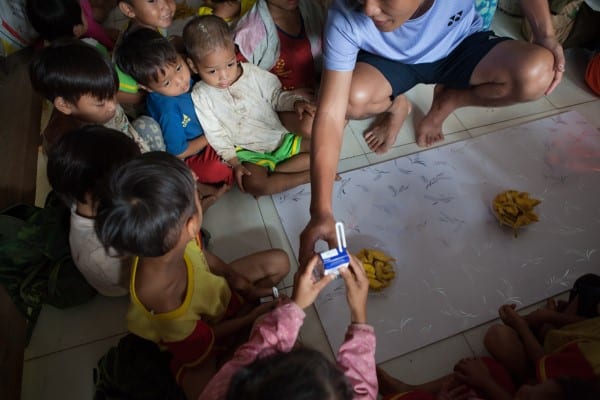This page contains affiliate links. This means if you a follow a link and make a purchase, at no additional cost to you, Humanitarian Careers will receive a commission. Thank you for supporting the site.
International aid and development workers respond to crises and conflicts around the world delivering aid to people in need. Most people know that’s the role of international aid and development workers. However, there is much more to working in humanitarian action that just responding to disasters. We’ve broken down the main things that international aid and development workers do…
Distributes Aid
The first, and most important, thing international aid and development workers do is distribute humanitarian aid. When people are affected by disasters or conflicts, they have significant needs and aid and development workers run projects to try and meet these. Ensuring crises affected people receive the aid they need is one of the main things international aid and development workers do.
When a humanitarian emergency occurs, the people impacted require a huge range of support. Everything from shelter, water and food to non-food items such as sanitary products are need to be distributed. Alongside this, projects protecting vulnerable people, childhood nutrition and education are often required. Setting up and running projects such as these is a key part of what an international aid and development workers does.
Conducts Assessments
When international aid and development workers set-up projects, they must first conduct assessments to establish the needs of the affected people. Assessments are done so that accurate information can be got on what aid should be distributed. Humanitarian assessments are also completed so that the community can tell aid and development workers what they need. Doing assessments is a key part of being an international aid and development worker.
Assessments of humanitarian need are one of the most important things an international aid and development worker does. Needs assessment in humanitarian crises are crucial for planning, building and running an effective aid response. Getting a full understanding of what crises affected communities need, and want, as part of an aid response is one of the main things international aid and development workers do.
Manages Grants
Many humanitarian projects are funded by grants given by donors. Managing these grants is one of the things an international aid and development worker does. Grants for aid projects can be given by government donors, such as UK Aid and US Aid, or international bodies such as the UN or EU. Organisations that give grants to fund humanitarian work expect adherence with their rules and guidelines and so a big part of what an aid worker does is ensure grant compliance.
Funding grants received by humanitarian NGOs can be worth tens of million of dollars. The donor agencies that provide these funds need to ensure accountability and so managing grants effectively becomes one of the important things international aid and development workers do. Reporting, financial management, data collection and media communications are all key parts of grant management and so are things that aid workers need to do.
International Development Online Courses
If you want to know about what an international development worker does, we recommend taking an online short course. We think the Management of International Development: Towards Agenda 2030 course is great. It looks at the current international development model as well as the trends that will be key to global development in the near future. Follow the link to the course’s page for more information.
We also think the online course Sustainable Development in the 21st Century by Yonsei University to be one of the best for those interested in international development. Delivered by former UN Secretary General Ban-ki Moon, the online course would be a great addition to the CV of anyone looking to work in international development. The link is to the course’s page.
If you are interested in the practical methods used on international development projects, we recommend the online course How To Design & Fund International Development NGO Projects. The course teaches students the tools needed to establish and run impactful development projects. Click the link to visit the course’s page for more information.
Coordinates with Other Actors
When disasters hit, there are often many responders. With a mixture of local groups as well as, national and international NGOs all taking action, it is crucial that they coordinate where they will dedicate resources. Ensuring effective coordination is a really important part of what an international aid and development worker does. Attending coordination meetings, liaising with other actors and forming partnerships are all key things aid workers do to ensure effective coordination.
Humanitarian coordination aims to maximise the effectiveness of a response by limiting the duplication of efforts and improving the allocation of aid. If two NGOs work in the same place on the same project, there is likely to be another location where aid is needed that isn’t being served. Making sure that an NGOs is feeding into the coordination mechanisms and is fitting within the wider response is a crucial part of what an international aid and development worker does.
Liaises with Authorities
Another thing international aid and development workers do is work with authorities. In crises and disaster zones local and national governments, as well as armed forces, militias and community groups are all key to ensuring an aid projects success. Working well with these authorities, as well as ensuring buy-in and compliance for an NGO’s humanitarian project are important part of working in international aid and development.
In all humanitarian responses it is vital that NGOs responding feed-into the already existing frameworks, often ran by local and national governments. Avoiding setting up parallel responses as well as ensuring coordination and compliance with the authorities are key parts of working in international aid and development. Humanitarian NGOs also often try to build the capacity of local and national authorities so as to better respond to crises in the future.
Engages with Communities
It’s vitally important that people who receive aid play an active role in the humanitarian response. One of the most important things international aid and development workers do is engage with communities who are receiving aid. This can include attending meetings, running focus groups, hiring local staff and meeting community leaders. Engaging with local populations is crucial to an effective humanitarian response and a key part of what international aid and development workers do.
Engaging with communities is an important part of humanitarian aid because it allows the affected population to buy-into and own the response they are receiving. It also avoids misunderstandings and errors in humanitarian aid distributions, as well as helping to ensure acceptance by the community. Working effectively and building good relationships with the communities they work in and aim to help is a really important thing that international aid and development workers do.
Manages Logistics
In order for humanitarian aid to reach people in need, complex supply chains and logistics are required. One of the things international aid and development workers do is manage the procurement, transportation and warehousing of humanitarian relief supplies. Many aid projects have tens of thousands of dollars’ worth of aid that needs to be moved toward distribution sites, or stored ready for an emergency response. Managing logistics is a key part of being an international aid worker.
International aid and development workers need to be experienced in how to manage humanitarian logistics, as well be able to coordinate supply chains in often difficult contexts. Humanitarian responses require huge amounts of aid to reach affected people quickly and disasters and crises can make moving supplies a challenge. Working to deliver aid to hard-to-reach places, urgently and effectively, is one of the things international aid and development workers do.
Oversees Finances
Another important thing that international aid and development workers do is manage finances. Aid projects can have budgets of several million dollars. It’s crucial that humanitarian aid finances are managed correctly and the funds best used to help people in need. This means international aid and development workers must account for their expenditure, manage cash and bank accounts, keep financial records and forecast budgets. Financial management is a crucial part of an aid workers job.
Financial management is key do an aid projects success. International aid and development workers must work to the correct accounting and financial procedures. Another important thing international aid and development workers do is tackle corruption. As crises zones are difficult places and aid agencies often have huge cash reserves, international aid and development workers try and ensure humanitarian funds are used correctly.
Directs Human Resources
Humanitarian operations can have large teams and so international aid and development workers need to manage human resource procedures and policies. Like all organisations, HR in a humanitarian NGO is crucial to employing, retaining, managing and, if needed, removing staff. Most humanitarian NGOs have HR staff in each area of operation and directing HR management processes is one of thing international aid and development workers do.
Effectively managing staff is crucial to a humanitarian operations success. As humanitarian NGOs can have can have hundreds of staff spread across many offices and field locations, one of the important things international aid and development workers do is oversee the HR management of the NGO. Ensuring effective HR of the humanitarian mission is one of the key things international aid and development workers do.
Manages Security
Disaster zones can be highly dangerous. As societies breakdown and crises develop risks to humanitarian workers increase. As a result, one of the most important things an international aid and development workers does is manage safety and security. Ensuring the security of their team, operation, premises and aid supplies is a vital part of being an international aid and development worker. It is crucial they know effective safety and security management to operate in crises zones.
Humanitarian relief operations can also take place in active areas of conflict. Often humanitarian workers must deliver aid in the midst of wars and this is another reason managing safety and security can be one of the things an international aid and development workers do. Developing security procedures, analysing risks, monitoring situations and building networks of contacts are all things an international aid and development worker do to manage security.
Writes Reports
Another thing international aid and development workers do is report writing. Aid workers must complete report for donors, as well as internal reports for HQ and regional offices. At field bases, international aid and development workers must file reports on their activities, security situation, logistics and finances. Writing good, concise and accurate reports is one of the things international aid and development workers do.
International aid and development workers must write reports for several reasons. Firstly, to provide an update to other functions within the NGO of the progress of the aid response. Secondly, as a situation report updating on how the humanitarian context is developing and thirdly as evidence of how donor funds have been spent. Report writing is one of the major things international aid and development workers do.

Monitors and Evaluates the Aid Projects
International aid and development workers must monitor and evaluate the aid projects they manage and this one of the most important things they do. In order to assess how an aid project is going, and ensure that it is having the impact required, international aid and development workers must continually evaluate and monitor. Effective monitoring and evaluation ensures an aid project’s accountability and is one of the crucial things international aid and development workers do.
Monitoring, evaluation, accountability and learning, known as MEAL, is a key department within humanitarian NGOs and often has a specific job in international aid and development to oversee it. Aid work needs to be accountable to both beneficiaries and donors, and effective monitoring and evaluation of aid projects is key. Collecting data, doing surveys, monitoring outcomes and ensuring accountability are some of the things international aid and development workers do.
Builds Partnerships
One of the most important things international aid and development workers do is build partnerships. For humanitarian responses to be effective they require aid agencies and other actors to work together. International aid and development workers build partnerships with other NGOs, both local and international, and well as community groups, governments and donors. Ensuring the aid response is partnered effectively is one of the most crucial things international aid and development workers do.
International aid and development workers can build formal partnerships with other NGOs. Often this is done by an international NGO partnering with a local NGO so as to help with implementation and to build their capacity. International aid and development NGOs can also partner formally or informally with other actors to pool resources, build capacity or share information. Building partnerships is being seen as one of the most important things international aid and development workers do.
Works in a Team
International aid and development workers need to work in teams. Making sure teams responding to humanitarian emergencies operate effectively is one of the most important things aid workers do. All parts of a humanitarian response, including front-line aid workers, logistical support, finance and management all need to work together to make a humanitarian response effective. Building a good, cohesive, teams is a crucial thing that international aid and development workers do.
When responding to a disaster or crises, international aid and development workers must work across large teams to ensure aid reaches people in need. Humanitarian NGOs can employ hundreds of people, often spread across multiple field and coordination offices. One of the things international aid and development workers do is make sure team management and communication is working well and that a strong team is working together to deliver aid.
Writes Funding Proposals
Most large humanitarian responses are funded by international donors. These can include governments, such as the US, UK, Canada, Germany, France and Sweden, as well as international bodies such as the ECHO and UN. One of the things international aid and development workers do is write funding proposal to donors to secure more funds for their aid projects. Developing, researching, writing and planning proposals is a key thing aid workers do.
Many humanitarian responses are initially funded using NGOs own funds. However, to sustain longer operations, NGO’s seek larger donors. This means one of things international aid and development workers need to do is write funding proposals. Donor agencies often have NGOs compete against each other for funding and so international aid and development workers can write many proposals in order to secure funds for their projects.
Analyses the Context
Humanitarian emergencies are complex, changeable and often dangerous places to work. One of the things international aid and development workers do is analysis the context they are operating in. Ensuring a full understanding of the humanitarian context is key to making sure that the correct aid is delivered to people in need, as well as to ensure the safety and security of the aid operation. Context analysis is one of the foundational things all international aid and development workers do.
International aid and development workers are deployed abroad to set-up and run humanitarian relief projects. This means they are operating in unfamiliar contexts and so one of things they do is make sure to build a strong understanding of the place in which they are working. Context analysis, through research, contacts, groups and analysis is key to making sure an aid operation is contextually appropriate.
Manages Communications
Disaster and conflict zones where aid workers operate are confusing and changeable scenarios. One of the things international aid and development workers do is manage communications. This can include information sharing between the field and coordination offices, between different field bases and with HQ. Making sure there is a timely and accurate information flow giving the required details is key to an aid responses success. Managing communication is a crucial thing aid workers do.
Another way international aid and development workers manage communications is through the media. Humanitarian NGOs need to get good communications out about what is happening in a crises zone and how they are responding. This is important for both political advocacy as well as fundraising. This means one of the things international aid and development workers to do is liaise with the media, create original communications and bare witness to humanitarian disasters and crises.






